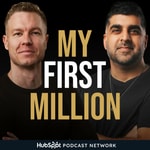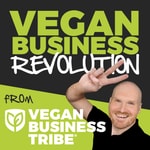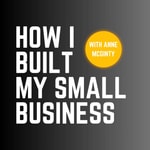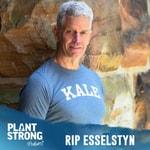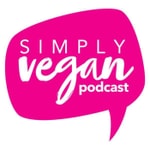Greenhero – Détails, épisodes et analyse
Détails du podcast
Informations techniques et générales issues du flux RSS du podcast.

Greenhero
Rikard Bjorkdahl
Fréquence : 1 épisode/7j. Total Éps: 28

Classements récents
Dernières positions dans les classements Apple Podcasts et Spotify.
Apple Podcasts
🇫🇷 France - nutrition
08/04/2025#87🇫🇷 France - nutrition
07/04/2025#66🇫🇷 France - nutrition
06/04/2025#55🇫🇷 France - nutrition
05/04/2025#45🇫🇷 France - nutrition
04/04/2025#32
Spotify
Aucun classement récent disponible
Liens partagés entre épisodes et podcasts
Liens présents dans les descriptions d'épisodes et autres podcasts les utilisant également.
See all- https://www.onepercentfortheplanet.org/
82 partages
- https://switch4good.org/
28 partages
- https://veganbusinesstribe.com/
16 partages
Qualité et score du flux RSS
Évaluation technique de la qualité et de la structure du flux RSS.
See allScore global : 58%
Historique des publications
Répartition mensuelle des publications d'épisodes au fil des années.
#27 – Getting vegan businesses get off the ground w/ Founder and CEO of Vegan Business Tribe David Pannell
Épisode 27
mercredi 26 octobre 2022 • Durée 34:26
Joining Rikard today on the Greenhero Podcast is David Pannell, co-founder of Vegan Business Tribe, a community for plant-based entrepreneurs that helps grassroots vegan businesses get off the ground.
David’s vegan journey started purely through an effort to improve his diet. It actually took him close to 10 years to make a complete transition through meat and dairy reduction. But initially, he found himself gravitating towards unhealthy foods during his time working in a corporate business. But once he began eating vegetarian, he found himself following a rabbit hole of sorts. He came upon a video of male chicks being treated as a waste product in the UK, which ignited his passion for veganism. With his transitory period turning out the way it did, he feels strongly that there is no moral high ground to take over those who are pre-vegan. As he puts it, none of us were born vegan. We started out in the exact same place as everybody else. Now, he and his partner share that mentality through business practice, helping brands understand the consumer journey and the prominence of flexitarianism. The vegan sector has seen massive growth because of it. Especially where David is located in Europe–the idea of veganism is no longer new, and has started to mature.
The Vegan Business Tribe was founded in part, thanks to a spark from a UK vegan activist who pointed out that just because you’ve turned vegan doesn’t mean the impact of animal agriculture was halted and harmful practices have stopped, you’ve just opted out of it. With that in mind, David and his partner realized they could utilize their expertise in growing markets in bolstering vegan businesses. In doing so, they began to work with large brands, understanding the money wasn’t there with individual, smaller-sized companies. However, through collective effort, they could move the vegan scene forward.
A primary hurdle David sees with his clients is they build a business for themselves, not their customers. Spending thousands of dollars on branding, websites, etc. before you have a client base is just a guess. David helps these businesses get their product or service into the hands of customers as soon as possible to start building that following. The approach for growth depends on the business owner as well, with some only having high gear and others taking a less aggressive method. David uses his own business, Vegan Business Tribe, as an example. It was free for a period of time while they built an audience, then he was able to step back and calculate what he wanted to monetize. It was about community first, and as he puts it, it isn’t about the location that brings us together, it’s about ethics. With this global reach and philosophy, he was able to see growth.
The trends David sees in the vegan marketplace aren’t exactly what you’d expect. Only 50% of his clients have anything to do with food or drink. He is seeing people with existing skills–web designers, programmers, and even lawyers, taking their skillset and applying them to a vegan cause. He’s found that everyone wants an ethical, environmentally conscious supplier and partner. In fact, larger companies can look for such branding as a way to reduce their own impact.
Things you’ll learn
None of us were born vegan. We started out in the exact same place as everybody else.
Moving the vegan mission forward toward a more ethical world means utilizing the skills you already have and applying them to veganism.
Much of the vegan market isn’t food and drink–there are shadow industries around vegan brands that include a plethora of careers.
Links
https://veganbusinesstribe.com/
https://veganbusinesstribe.com/content/podcast/
#26 – Plant-based eating towards gut health w/ Founder and CEO of Dish Dash Deets Dr. Sunni Patel
Épisode 26
mercredi 19 octobre 2022 • Durée 36:46
Today on the Greenhero Podcast, Rickard is joined by Dr. Sunni Patel, founder of Dish Dash Deets, as well as a scientist and gut health influencer that has made it his mission to come up with amazing plant-based recipes and lifestyle plans to help fight gut issues. Dr. Sunni has been featured on Ready Steady Cook, Newsround, and BBC Radio shows. He has helped many people improve problems such as fatigue, mood, immunity, gut, and other health issues using creative evidence-based advice paired with culinary planning and plant-based cooking.
Sunni has been living with inflammatory bowel disease and Crohn's disease since 2014, a condition that is often surrounded by taboo, insecurity, and mental and physical pain. He navigated those challenges until he had a lightbulb moment, as a healthcare professional, he had to turn toward his diet. He cut out dairy and other inflammatory foods before switching to a completely plant-based diet and hasn’t looked back since. Through his personal experience, he made the decision to retrain and utilize his Ph.D. to take a holistic, scientific approach to people’s health with their food and lifestyles. His philosophy is grounded in science and elevated by experience. He works with corporate leaders facing burnout, and people living with IBS and IBD and helps them improve their gut and overall health.
Gut health, Dr. Sunni reminds us, isn’t just in the stomach. It starts when food enters the body to when it exits. There are certainly ultra-processed foods that impact the bacteria in our gut and create symptoms that many people deem embarrassing, further worsening the problems they’re experiencing. It isn’t just “junk food,” though. It can be overhydration or reduction in fiber. He goes on to note that it isn’t just the foods we consume, but our lifestyle influences our gut health as well. Stress management, addictive behaviors, and using addictive substances (yes, caffeine!) all make a difference in the levels of different bacteria in our gut. It impacts people of all ages and genders, but that data is reliant on who feels comfortable seeking out the help they need. Typically, Dr. Sunni works with people who have been on this journey for a while but are in a place where they are seeking a more functional expert who can help them improve their quality of life without making massive sacrifices.
So, where does a plant-based diet come into play? It’s been proven that having a fiber-rich diet can help alleviate symptoms of IBS and IBD, but beyond fiber, a plant-based diet covers a gamut of health-related areas, providing vital polyphenols, antioxidants, and flavonoids that can be of benefit to people living with chronic, non-communicable diseases like diabetes, cancer, obesity, and heart disease.
Dr. Sunni and his partner have just launched Queer Health Foundation, which incorporates lifestyle medicine and community to a cohort of individuals who experience many health inequalities. It is meant to allow for more education for practitioners and provide access to services for those that are vulnerable free of charge within the queer community.
Things you’ll learn
It’s been proven that having a fiber-rich diet can help alleviate symptoms of IBS and IBD, but beyond fiber, a plant-based diet covers a gamut of health-related areas.
Gut health, Dr. Sunni reminds us, isn’t just in the stomach. It starts when food enters the body to when it exits.
It isn’t just the foods we consume, but our lifestyle influences our gut health as well. Stress management, addictive behaviors, and using addictive substances (yes, caffeine) all make a difference in the levels of different bacteria in our gut.
Links
https://www.dishdashdeets.com/
@drsunnipatel
#17 – Cell-based oysters on a half shell w/ Founder of Perlita Foods Nikita Michelsen
Épisode 17
mercredi 17 août 2022 • Durée 25:31
Thanks for joining us on the Greenhero Podcast with your host, Rikard Bjorkdahl! On the show today is Nikita Michelsen, founder and CEO of cell-based company Pearlita Foods. Driven by her passion for human health and reversing climate change, Nikita decided to launch her company to build the future of seafood. Nikita and her team are on a mission to grow the universally loved oyster in a lab environment. In this way, we can keep more oysters in the ocean as nature's own filtration system to clean water.
Pearlita Foods was founded through a passion for maintaining important cultural traditions, flavors, and experiences without harm to the environment. Delicacies are becoming harder to get and more expensive, and Nikita feels that cell-based alternatives are the most authentic replacement. By using cell-based technology, Pearlita Foods can build the same flavor profile with the same nutritional value. With a background in marketing at SynBioBeta, a leading synthetic biology company, Nikita intersected her love for food with science for the better of the future of food.
Cell-based technology is complicated, but with a small biopsy for the type of tissue you’re trying to grow, you can attach it to a ‘scaffolding’ to develop into a product you can consume the same way you would in any other capacity. By targeting desired flavors and textures, you can build a flavor profile that matches the original. No shell, but the product will be packaged in a biodegradable, bright covering.
Oysters are ecosystem warriors to help filter water and carbon sequestration. Therefore, harvesting them after a year or two of development cuts short the impact their 20-year lifespan could have. By eventually immortalizing the line of tissue, this problem can be overcome.
Pearlita Foods has seen success partnering with restaurants, as it helps educate consumers and build interest and intrigue around the product. At the same time, it provides valuable feedback from consumers and chefs to build from. Eventually, they will shift to an online format, shipped directly.
As far as scaling, at present, it’s about bringing down costs to get the product to the public. Beyond that, accelerating the production process will help the growth of the company.
Consumer perception is top priority in getting an acceptance into the market. It’s not Frankenstein food–food grown in a lab is much cleaner and safer, it's sterile from start to finish, you will know immediately if there's contamination, and you won't get any contaminated food from a lab.
Comparatively, lab-grown oysters are absolutely less impactful on the ecosystem, but harm to the oceans is a complex problem. Farming can cause harm to the space around it, so bad eliminating that need, the impact is great.
Things you’ll learn
By using cell-based technology, Pearlita Foods can build the same flavor profile of oysters with the same nutritional value.
Oysters are ecosystem warriors to help filter water and carbon sequestration. Therefore, harvesting them after a year or two of development cuts short the impact their 20-year lifespan could have. By eventually immortalizing the line of tissue, this problem can be overcome.
Food grown in a lab is much cleaner and safer, it's sterile from start to finish, you will know immediately if there's contamination, and you won't get any contaminated food from a lab.
LINKS AND SOCIAL
https://www.pearlitafoods.com/
https://www.linkedin.com/in/nikita-michelsen-a575b511a/
#16 – Plant-based eating starts at work w/ Founder & CEO of Plants+Perks Chloe Sweden
Épisode 16
mercredi 10 août 2022 • Durée 21:29
On today’s episode of the Greenhero Podcast, Rikard is chatting with Chloe Sweden, founder and CEO of PLANTS + PERKS, the world's first benefit app that empowers employees to live healthier and more sustainable lives. Chloe and her team are taking plant-based eating to the workplace to inform, incentivize, and inspire people to be part of the Green Revolution.
PLANTS + PERKS is about supporting employees in reducing their meat and dairy consumption for personal and planetary health. With a background as Head of Talent and Culture at multiple corporations, Chloe has extensive experience in motivating and encouraging staff. And right now, sustainability is at the forefront of many companies’ minds. They’re asking “How can we keep our employees healthy?” and “How do we engage our employees?” Both are valuable and important questions regardless of industry.
Companies’ reasons for utilizing PLANTS + PERKS vary. Some are looking to attract younger generations of talent, and being a green, sustainable company is an attractive trait to have when potential employees are in search of an ethical place to work. Some aren’t able to increase wages, so they’re looking to cut the cost of living for their employees. And for others, it’s to genuinely improve the health and lives of those who work for them.
By giving discounts on body and planet-friendly products, employee engagement in benefits will see a rise, especially when compared to a typical pension scheme. Companies typically do a bad job of bringing their employees along with them on their sustainability journey. Setting large goals with no buy-in can lead to frustrating working conditions. With PLANTS + PERKS, employees are informed and brought along through healthy options as a benefit.
Where Chloe is in the UK, she doesn’t see the traditional delivery of information sticking. The products are available, and the cost of living has gone up, causing people to opt for cheaper meats and dairy products. People have the knowledge in the back of their minds, but it isn’t ingrained in their culture. It’s about making it desirable. Everyone comes at sustainability and plant-based eating from a different angle–it’s about incentivizing change regardless of their circumstance. A personalized path for each person can lead to a real impact.
Freebies and samples can help people get over an ideological hurdle. For some people, a small change can feel much bigger. PLANTS + PERKS helps reduce barriers and free the route towards plant-based eating.
Measuring the impact PLANTS + PERKS can make on a company’s sustainability is important to reach overall goals. But right now, it’s important to do something, because any shift makes a difference. User feedback has been brilliant, both on the information end and the product end. Now, it’s time to double down on what people like most.
Things You’ll Learn
PLANTS + PERKS is about supporting employees in reducing their meat and dairy consumption for personal and planetary health.
Incentivizing a healthy and sustainable lifestyle can help employees feel on board with overall company goals.
Freebies and samples can help people get over an ideological hurdle. For some people, a small change can feel much bigger. PLANTS + PERKS helps reduce barriers and free the route towards plant-based eating.
LINKS
https://www.plantsandperks.com/
#15 – Leapfrogging Africa into plant-based eating w/ Founder & CEO of Infinite Foods Michelle Adelman
Épisode 15
mercredi 3 août 2022 • Durée 33:51
Today on the Greenhero Podcast, Rikard is chatting with Michelle Adelman, co-founder and CEO of Infinite Foods. She has 30 years of business experience as a former Global Managing Director for Accenture, CEO of a US-based home health services company, and Group Strategy Executive for the pan-African Econet Group. In 2017, Michelle was named by CEO Global as Africa’s Most Influential Woman – Business & Professional Services and in 2019, Michelle was named to the Forbes Africa “20 New Wealth Creators” list.
While working at Accenture, Michelle visited Africa, where she spoke with local members of the community she was visiting. There, she began to visit orphanages and schools and saw the impact people could have on the children’s lives. The work she did through The Impact Fund and her business experience brought jobs to women and children in southern Africa.
The work she does now surrounds agriculture and food systems, spawned from the idea of breaking into new areas of income for the area. In Botswana, a mostly desert country, she disrupted the food chain and brought hydroponics to the consumers. It’s a local-to-local business model where they grow locally for local consumption. Michelle’s work around plant-based products is centered on the productivity of agricultural land and its beneficiaries.
In Africa, it’s not so much about overconsumption of meat and dairy products, it’s about getting quality, affordable protein to people. Plant-based products can change the food system in Africa and allows small farmers to increase their economic impact. By leapfrogging industrialized production, they are able to build a sustainable system.
The first step to changing the food system is changing people’s thinking about plant-based food. If we're going to convince people that as they start consuming more meat and dairy, and more protein, they should be doing it from plant-based sources, rather than animal-based sources, we have to interrupt their thinking about what this kind of food is all about. The second step is scalability–looking at local brands and incubating them, as well as introducing international, recognizable brands to the market.
Meat is indeed a central part of African culture. And it’s important, Michelle reminds us, to not undo that culture. Nobody is passing judgment when they eat meat, especially at celebrations. But when they aren’t, what are the plant-based alternatives?
Growth of this market is certainly centered in the US, Michelle says, but it’s important that we understand it’s still a tiny fraction of the market, and even in rural US towns, plant-based foods aren’t an option. In Africa, they are promoting primarily the health benefits of plant-based eating, as the climate impact and changes to combat it is still being adopted.
Things you’ll learn
There have been major strides in changing the food system in Africa through protein found in plant-based foods.
It’s important to consider the grassroots growth of local plant-based businesses and incubate them as they enter the market.
Introducing recognizable brands to the market helps scale the overall impact of plant-based foods.
LINKS
https://www.infinitefoods.com/
#14 – Plant-based restaurants for everyone w/ Veggie Grill Founder T.K. Pillian
Épisode 14
mercredi 27 juillet 2022 • Durée 28:50
Today on the Greenhero Podcast, Rikard is talking with T.K. Pillian, Founder and Chairman of the plant-based restaurant chain, Veggie Grill. T.K. is on a mission to help people eat more plant-based food by making it more accessible and delicious. Veggie Grill has grown to more than 34 locations and expanded into Stand-Up Burgers and Mas Veggies Vegan Taqueria.
T.K. was not a restaurateur by trade. In fact, he got his degree in engineering from MIT and picked up an MBA along the way. After growing and exiting a company he started in the tech space, he was ready to consider what the rest of his professional career would look like. Driven by his passion for health and wellness and to combat our dependency on pharmaceuticals, obesity, and heart disease, T.K. wanted to help make a difference. Having experienced personal health benefits after going completely vegan, he asked the question “how can we get people to eat better? And how can we make it convenient, delicious and healthy?” He found that with the right products, the right techniques, and the right branding, vegan and plant-based foods could do what Starbucks did for coffee, what Whole Foods did for organic food–bring it to the mainstream.
To do just that and to maximize impact, Veggie Grill was designed to be a chain from the onset as opposed to being chef-based. From there, it was developing the right strategy, utilizing the plethora of newest and best products that were then becoming more and more available, and scaling.
In today’s media, T.K. feels it’s a lot less about educating the population about plant-based food, and more about breaking habits, making healthy food available, and helping people start and progress on their plant-based journey. The proof is in Veggie Grill’s customers, who vary from those who are trying their first vegan meal, people who are looking for a healthier option, to people who have been vegan most of their lives.
As far as branding goes, Veggie Grill’s concept started with the experience. They wanted to take a top-down view of what it was like to eat at the restaurant before they moved on to anything else. The goal was for the experience to be fun, friendly, and approachable, as well as clean, crisp and contemporary. This was to help encourage people who may be skeptical of a vegan restaurant, or those who have other perceptions of what it might be like, try out a healthier food choice. During the pandemic, Veggie Grill pivoted to expand into two smaller, more flexible brands, focused on burgers and tacos, respectively.
T.K. primarily sees the plant-based food boom in larger metropolitan areas with a higher density of college-educated people, whose reasons for eating plant-based varies from animal protection, environmental impact, and health. T.K. sees the future of plant-based eating as an opportunity to include in today’s market, not to compete with meat products. As an investor, he can see the next generation working on the form factor of these plant-based foods, which gives him hope for the industry.
Things you’ll learn
The key to maximizing the impact of plant-based foods is making them accessible.
Introducing plant-based foods starts with the experience of eating at a plant-based restaurant.
The next step in the plant-based food industry is the form factor.
Links
https://veggiegrill.com/
#13 – The ABC of cell-based meat w/ TurtleTree's Chief of Staff Kara Leong
Épisode 13
mercredi 20 juillet 2022 • Durée 30:48
Joining Rikard today on the Greenhero Podcast is CEO of cell-based food company, TurtleTree, Kara Leong. She’s here to break down the complex topic of cell-based food, something not plant-based, but not animal-based either. Lab grown food will certainly be part of our future, but how can we get comfortable eating it? With her extensive scientific background, Kara will try to make these complex topics simple.
Cell-based food, or cellular agriculture, is another way of producing food outside the traditional methods of raising crops or keeping land and raising livestock. Cell-based food is taking a sample of cells from an animal, whether that's fish, chicken, pig, or cow, and growing them in a temperature bioreactor. Once a large amount of cells has grown, they can be harvested and turned into a food product without the animal’s involvement.
At the crux of cell-based food is understanding the cell-line and making sure the animal the food is being developed from lives a long, happy, and healthy life. It can take a decade to characterize the line and understand how they work, what they do, and what they're capable of. This isn’t a new science, as CHO (Chinese Hamster Ovary) cells have been well studied and haven’t been near an animal for quite some time.
We’re at the point now where the science is there, but to commodify and sell a food product is an entirely different set of challenges. It still has to be commercialized and to appeal to people and still needs to taste great.
While the ultimate goal is to have a completely cell-based structured product, the more feasible path is a hybrid product of cell-based and plant-based products. Filamentous fungus (think mushrooms) are a good candidate for a hybrid product, as they’re easy and fast growing and already possess an umami profile. By including just 10% cell-based food to the product, you can really replicate the meat-eating experience.
To get to that goal, it’ll take development of equipment, lowering cost, and other aspects like FDA approval. “Flat” products like bacon are the next possible products, but eventually the goal will be products with differentiated structures like bone and fat.
The dairy space is also one that is being explored by Kara and her team. As it stands, companies can produce casein and whey, two primary proteins found in milk. However, lactation biology is a very complex science, as milk is vast amounts of molecules interacting with each other.
At TurtleTree, they’re working to produce high-value bioactive dairy protein that's found in both human milk and bovine milk–bovine lactoferrin. It’s found in early breast milk, providing dense nutrients and immunity to nursing infants. But, in typical milk, it’s .1% of the product, meaning you’ll have to drink a massive amount of milk to get the protein. It’s VERY difficult and expensive to extract the protein and typically used in premium formula, but only for a small percentage of those brands. TurtleTree is aiming to make this high-value protein available and feasible to use in all infant formula.
Things you’ll learn
Cell-based food, or cellular agriculture, is another way of producing food outside the traditional methods of raising crops or keeping land and raising livestock.
While the ultimate goal is to have a completely cell-based structured product, the more feasible path is a hybrid product of cell-based and plant-based products.
TurtleTree is working to produce high-value bioactive dairy protein that's found in both human milk and bovine milk with the ultimate goal of making the protein more widely available in infant formulas.
LINKS
@TurtleTree
Kara Leong on LinkedIn
#12 – The proof of why a plant-based diet is the way to go w/ host and founder of The Proof podcast Simon Hill
Épisode 12
mercredi 13 juillet 2022 • Durée 44:46
On the Greenhero Podcast today, Rikard is joined by Simon Hill, founder and host of the massively popular podcast and blog, The Proof. There, he deciphers scientific studies to figure out how you can fuel your body to promote longevity while simultaneously achieving your fitness goals. He’s also an author, nutritionist, and physiotherapist, all while running a plant-based restaurant in Bondi Beach, Australia.
Simon transitioned to a fully plant-based diet over the course of 9 months, a huge shift from his previous eating habits. The impetus for this change was his brother bringing him new information, his own experience in reviewing and writing scientific papers, and a frightening moment when his father suffered a heart attack at just 41 years old. These factors compelled him to research a plant-based diet and it became clear that there were some changes he could make to his diet that would significantly reduce his risk of cardiovascular disease.
Over years of accumulating more through his graduate degree in nutrition science, he was inspired to develop a hub and resource for his community to tap into to feel more empowered in transitioning to a plant-based diet. Any shift away from the ‘norm’ can be daunting, so much of what Simon does is offer confidence through science.
Simon feels that most people know that they should include more fruits, vegetables, legumes, and whole grains into their diets. It’s about being better at doing what we already know. The implementation of all the information out there is the real hurdle.
His tactics when working with people transitioning to a plant-based diet starts with breaking down a large goal into a small one. In doing so, you’ll naturally push other things out of your diet, because it’s not just about what you add, it’s about what you replace as well. It’s important to understand the lesser density of calories in plant-based foods. While this is beneficial to some, if you’re not looking to lose weight, keep an eye on the caloric intake. Finally, treat plant-based foods the same way you would animal-based proteins. You wouldn’t cook a chicken plain and expect it to taste like anything. Just like any food, adding spices, herbs, or marinades will make a world of difference. Variety is the spice of life.
There is evidence that for some individuals who have a severely disrupted microbiome, meaning the bacteria in their gut is out of balance, a sharp increase in fiber can cause inflammation and bloating. For these folks, as well as others who cannot eat fiber, there are alternatives to diversity your microbiome through fermented foods and polyphenols (antioxidants found in blueberries). For some, it may just be a slower introduction to fiber. It’s about the gradual return to health, not a band-aid.
Over the last five years, Simon has seen real growth in the plant-based industry in Australia and New Zealand. The consumer acceptance is there, he says, but there is still a long way to go. With the help of a new government, there can be a bigger focus on the environment. As we’ve now converted much of the planet into a farm, reducing our land usage by switching to a plant-based diet and relying less on animal agriculture, we can re-wild the land that plays such an important role in the regulation of the climate.
Things you’ll learn
Most people know that they should include more fruits, vegetables, legumes, and whole grains into their diets. The implementation is the real hurdle.
Start small. Focusing on one meal a day is a good place to start transitioning into a plant-based diet.
Finding simple swaps, like plant-based milk over cow’s milk, is an easy way to start making a change.
Links and Socials
@SimonHill
@theproof
https://theproof.com/
#11 – Plant-based eating through an intersectional lens w/ founder of Veggie Mijas Amy Quichiz
Épisode 11
mercredi 6 juillet 2022 • Durée 25:32
Today on the Greenhero podcast, Rikard is with Amy Quichiz, speaker, activist, and founder of Veggie Mijas, a community for vegans and people interested in plant-based eating that have marginalized identities and or experience with food insecurity and food apartheid, working primarily with vegans of color and people from the LGBT community.
Amy grew up in Queens where access to healthy food options was virtually non-existent. In reality, the only choices were fast-food or other non-nutritious foods. When she went to college and started to learn about Women and Gender studies, she began to open her eyes to veganism, its accessibility to people of color, and the shared experience of people like herself.
When Amy tried to enter vegan spaces, she found that they were extremely white, both in race and in consciousness, which is and was very problematic. Many people who grew up in a privileged environment have had constant access to vegan-friendly food options and have developed a gatekeeping, near policing mentality towards veganism, spending more time in judgment than not. In addition, they weren’t able to see how versions of protests, such as locking themselves in cages, were triggering to many communities. The intersectionalities of what is considered ethical consumption, what is a ‘choice,’ and the foods available around communities that are predominantly people of color aren’t acknowledged in these spaces.
Accessibility missing from major panels and other platforms is now a major driver of Vegie Mijas’ mission. Originally started as a page to collect affordable, easy vegan recipes, Veggie Mijas grew into a way to share recipes from all over the world, developing a family of vegans, who Amy noticed were from marginalized communities. After a massively successful pot-luck attended by more than 35 Veggie Mijas group members, people across the country did the same, opening chapters in Oakland, Chicago, LA, and more.
There are a variety of reasons people join the Veggie Mijas collective, especially when members come from such a wide span of experiences. Yes, food accessibility is a big part of everyone’s mindset, but environmental reasons, as well as providing a judgment-free space to transition to veganism make Veggie Mijas home for so many people. It’s about being comfortable, understanding cultural and ancestral foods, and honoring them.
Giving people language is important in veganism, Amy says. It’s about educating people on the foods they already eat and giving people ownership of what they’re eating.
Things you’ll learn
Vegan food options are not accessible to all communities in the same way. Marginalized communities often have little to no access to healthy food options.
Vegan spaces can be dominated by a judgemental mentality and can become problematic in their ignorance of others’ lived experiences.
It’s important to provide people with language to describe what they may already be doing. Many cultural foods are already plant-based.
Links and Social
@veggiemijas
https://www.veggiemijas.com/
#10 – Vegan activism and its place in our plant-based future w/ Viva!'s founder Juliet Gellatley
Épisode 10
mercredi 29 juin 2022 • Durée 36:59
Thanks for joining us on today’s episode of the Greenhero Podcast! This week, we’re with Juliet Gellatley, a British author of several reports, guides, and books on veganism, an animal rights activist, and founder and director of Viva! She’s the former director of the Vegetarian Society and winner of the Linda McCarthy award for animal welfare and the P.E.A award.
Juliet’s journey to a vegan lifestyle started at a young age. Even then, her mother would describe her as someone rooting for the underdog. She first demonstrated her activism by petitioning against snaring in the UK. From there, she was impassioned by leaflets and flyers on animal cruelty and factory farming, eventually leading her to become vegan. Growing up, this was isolating, but her drive pushed her through. She witnessed first-hand the horrors of industrial animal farming during that time, further hammering home her passion for helping animals. Once she made the decision to go vegetarian and eventually vegan, there was no going back, even though the options were slim and the support virtually non-existent.
From there, Juliet went to university and studied a combination of psychology and zoology so she could pick the parts of each degree that served her best in understanding the holistic view of an animal's life. When she graduated, she felt that a job in the field studying animals was too slow and wouldn’t have the impact she was looking for. So, she transitioned in media as an editor of a magazine and became the first Youth Education Officer for the Vegetarian Society. This was faced with media backlash, but she knew her heart was in the right place. Viva! came to being after Juliet became the Director of Campaigns, but felt the Vegetarian Society was more of a food body and less of an actionable, campaigning organization.
A combination of a generous donation, support from her then-husband producing content for the organization, and a team of passionate people got Viva! off the ground. At that moment, not only was it about educating the cruelty inflicted upon animals, but the fact that veganism was the solution. At the time, no one was making that claim, which resulted in some hesitancy from folks outside the organization.
From Juliet’s perspective, the words ‘plant-based’ were certainly more accessible for a time, but in recent years and in working with big brands like Tesco, the word ‘vegan’ has exploded. It went from a dirty word, she says, to a lifestyle to aspire to. Her take? Simple. Whatever works. Sell vegan food so people stop eating animals.
Juliet is seeing an emerging trend in reasons why people are going vegan. Whereas animal wellbeing has always been at the top, environmental reasons have recently surpassed health as the second most popular reasoning to go plant-based. The proof is in the media. Brands are making it easier to go vegan under a campaign of helping the environment and people are seeing it.
Juliet’s view on accepting people who are still eating meat is based on empathy. She calls it a road of compassion–a journey everyone goes on that is driven by the desire to improve. No one is perfect and gatekeeping a vegan lifestyle is only going to turn people away. The path is different for everyone. Everything should revolve around kindness; to animals, to yourself, others, and the earth.
Things you’ll learn
The vegan movement has only just recently exploded, and the market is ready to support the lifestyle
Environmental reasons for going vegan are on the rise, but animal wellbeing is at the top
Becoming vegan is a road of compassion. No one is perfect, and the journey will look different for everyone
Links and Socials
Viva.org.uk
@vivacharity on Instagram
@vivacampaigns on Twitter

